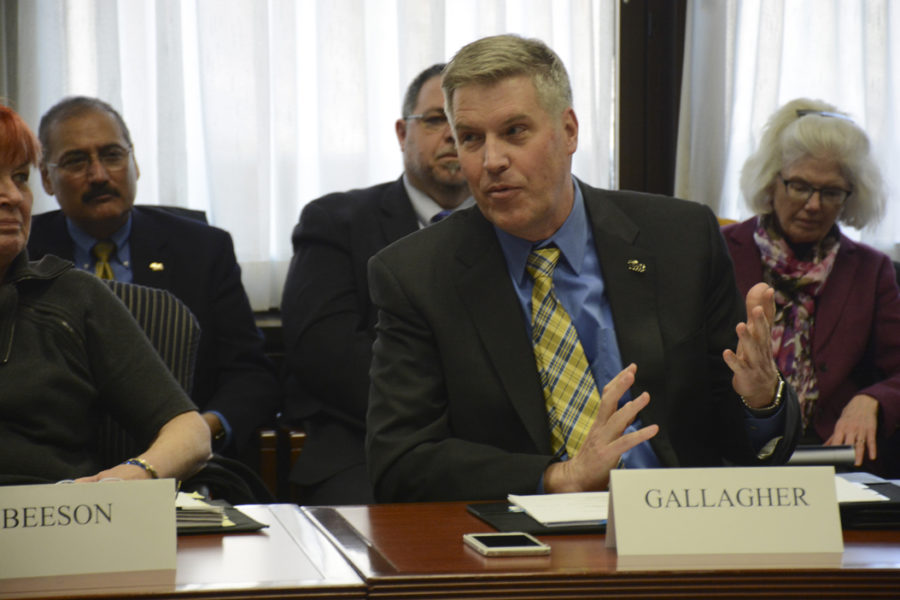Pitt’s University Senate Council discussed benefits for adjunct professors and threats to government research funding at its monthly meeting Wednesday afternoon.
Chancellor Patrick Gallagher opened the council with a short speech discussing the budget proposed by President Donald Trump last Thursday. The budget suggests deep cuts to many domestic agencies, including $9 billion from the Department of Education, $5.8 billion from the National Institutes of Health and $2.6 billion from the Environmental Protection Agency.
Funding from the NIH makes up 65 percent of Pitt’s total $726 million research funding from all sources last year. In 2016 alone, Pitt received $475 million in NIH awards for research and other purposes — the fifth highest of U.S. universities.
Gallagher said the cuts are the “most dramatic shift in priorities across the board [he’s] ever seen,” but he wasn’t worried they would come to fruition, pointing to bipartisan opposition to the severity of the cuts.
Gallagher didn’t say if the University had a plan if the cuts do pass, and wasn’t available for comment after the meeting.
Some Republican senators, like John McCain, Lindsey Graham and Marco Rubio, have come out in opposition of Trump’s budget for various reasons — mostly on its cuts to the State Department, which they worry will hurt America’s influence abroad. Democratic representatives have instead focused on how the cuts will affect social programs and regulatory power.
Looking at the state level, Gallagher said he wasn’t concerned about cuts, and instead expected Pitt’s state budget to stay constant if not slightly increase. Gov. Tom Wolf called education his “first priority,” when presenting the 2017 budget in February. In the 2017 fiscal year, Pitt was budgeted for $158 million from the state of Pennsylvania.
After going over the budget proposals, Gallagher announced Pitt would be establishing a position for a director of government relations, who will be based out of Washington, D.C.
Besides the position title and a resumé, the University declined to comment further on the position’s responsibilities. The University also denied that the position’s creation was related to the new president or his budget. Gallagher said at the meeting that he had been “thinking about [the position] for a while.”
For the new opening, Pitt hired Tony Gibson — who has previously worked as a senior adviser for legislative affairs for the National Science Foundation — Wednesday as a full-time employee. Gallagher added that Gibson would “start in a few weeks.” At the foundation, Gibson was “directly responsible for liaison activities with members of Congress and senior Congressional staff” according to his resumé.
But taking stock of the budget proposals during the meeting, Gallagher said to expect to see more of Pitt in Washington, D.C., instead of Harrisburg.
“Where in the past a lot of our outreach has been on the state side, I think you’re going to see more on the federal side,” he said.
In other news, the USC unanimously endorsed a report suggesting Pitt increase both benefits and pay for adjunct professors, as well as creating a standardized hiring process.
The report, which took four years to compile, suggests implementing health care benefits for part-time adjunct faculty, adding a minimum pay rate for three-credit courses and improving communication for part-time staff when their course are canceled due to low enrollment.
Speaking during the meeting, retired Pitt professor Irene Frieze, who chaired the report’s committee, said it dealt with “complex and neglected issues.” However, she also said that the University had already started fixing some of the issues the report found, although she did not specify any issues.
After Frieze spoke, the council room filled with raised hands as they all agreed to support the report’s results.
The endorsement does not indicate that the recommendations will become official policy, just that they are being considered further by the University.
Immediately after Frieze’s report, Pitt Provost Patricia Beeson said she had already set up an official committee to look into implementing the suggestions.
Beeson did not release further details on the adjunct professors’ committee, but Senate Council President Frank Wilson seemed optimistic that the suggestions could eventually be made rule, as shown by the committee’s prompt start.
“The administration has been part of the process, and they anticipated [the report] being approved,” Wilson said.



